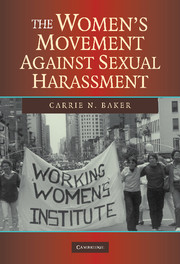Book contents
- Frontmatter
- Contents
- Figures
- Acknowledgments
- Organizational Abbreviations
- Introduction: Enter at Your Own Risk
- PART I RAISING THE ISSUE OF SEXUAL HARASSMENT
- PART II GROWTH OF A MOVEMENT AGAINST SEXUAL HARASSMENT
- PART III THE MOVEMENT'S INFLUENCE ON PUBLIC POLICY
- Conclusion: Entering the Mainstream
- Appendix A Time Lines of Significant Events
- Appendix B Glossary of Select Cases
- Notes
- Bibliography
- Index
Introduction: Enter at Your Own Risk
Published online by Cambridge University Press: 14 June 2019
- Frontmatter
- Contents
- Figures
- Acknowledgments
- Organizational Abbreviations
- Introduction: Enter at Your Own Risk
- PART I RAISING THE ISSUE OF SEXUAL HARASSMENT
- PART II GROWTH OF A MOVEMENT AGAINST SEXUAL HARASSMENT
- PART III THE MOVEMENT'S INFLUENCE ON PUBLIC POLICY
- Conclusion: Entering the Mainstream
- Appendix A Time Lines of Significant Events
- Appendix B Glossary of Select Cases
- Notes
- Bibliography
- Index
Summary
In March 1975, a group of feminist activists in Ithaca, New York coined the term ‘sexual harassment’ to name something they had all experienced but rarely discussed – unwanted sexual demands, comments, looks, or sexual touching in the workplace. The experience they wanted to spotlight was one that women in this country had faced since colonial times. Seventeenth-century indentured servants, eighteenth-century black slaves, nineteenth-century factory workers, and twentieth-century office workers all shared the experience of having fended off the sexual demands of those wielding economic power over their lives – masters, overseers, foremen, and supervisors.
Women responded to workplace sexual coercion in a myriad of ways, often submitting, but also resisting. Some escaped the situation, others tried using official channels to stop the abuse or seek relief from its effects, and yet others joined together to protest sexual coercion by their employers. Escape was the only option for many female slaves, who had little power to resist their owner's sexual advances, no legal recourse, and no home outside their owner's reach. In her 1861 autobiography, Incidents in the Life of a Slave Girl, Harriet Jacobs described her escape from a master who ‘began to whisper foul words in [her] ear’ when she was fifteen. Domestic servants who could afford to do so escaped the sexual abuse of employers by leaving their jobs. In 1874, Louisa May Alcott published an account of how at the age of eighteen she had left a job as a domestic servant because her employer assigned her backbreaking work after she refused his sexual advances.
Women sometimes turned to governmental authorities for help. Although colonial courts heard charges against masters for ‘violating’ female servants, making ‘forcible attempts’ on their chastity, and exhibiting ‘lewd behavior,’ victims rarely gained relief. In cases when a servant ended up pregnant, courts sometimes required masters to pay a fine or give security to maintain the child. However, indentured servants did not have easy access to the judicial system, and their direct dependence on those who assaulted them often dissuaded them from taking action. When former slaves registered charges of sexual abuse by white men with the Freeman's Bureau, an agency set up after emancipation to assist blacks, they seldom obtained relief.
- Type
- Chapter
- Information
- The Women's Movement against Sexual Harassment , pp. 1 - 8Publisher: Cambridge University PressPrint publication year: 2007



